First Person With … Jared Janczak
The pitcher focuses on getting healthy and finishing his redshirt senior season before heading for the Major League.
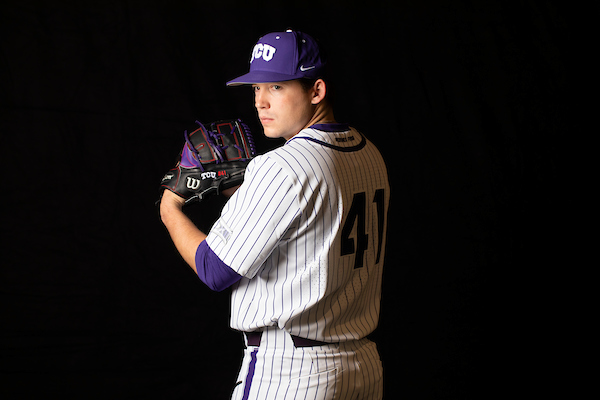
Courtesy of TCU Athletics | Photo by Ellman Photography
First Person With … Jared Janczak
The pitcher focuses on getting healthy and finishing his redshirt senior season before heading for the Major League.
The Texas native was a pick in the 2018 MLB Draft, but the All-American and all-conference pitcher decided to don the TCU uniform another season. Jared Janczak ’18 shares what it was like to persevere through a redshirt season and thoracic outlet syndrome surgery — and what redemption looks like in his senior season.
You graduated last May — congratulations — with a degree in geography. How’d you pick that major? I read that you had been interested in business?
I was interested in business but took a business minor. I’m not a really a numbers guy. I read about [geographic information systems] and learned about a little bit. I’m a visual learner and I like seeing patterns and seeing things that progress. It really piqued my interest to be able to work on the computer system and learning those cool methods and let the computer do all the math stuff for me.
You’re in the Master of Liberal Arts program. What classes are you taking?
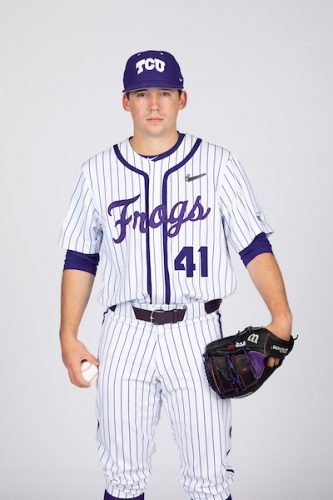
Jared Janczak said he fell in love with TCU. Courtesy of TCU Athletics | Photo by Ellman Photography
I am in Ethnicity and Language. It’s really interesting. I learned a lot about different types of people — different cultures and backgrounds.
The second class is Special Problems: Opportunity Recognition for MLA’s with Michael Sherrod. He has a lot of insights. He has many businesses that he started up on his own, so he’s really [teaching] us that you don’t have to be a business major to start a company or be in that environment. His ideas and his methods are respectable over his career. It’s not just the business school that does business.
Who is your role model?
My dad. He’s always been there for me and taught me what it’s like to be a man — my values and needs and wants in life and desires kind of tailor off of him. We’ve been really close, but he’s let me have my space and let me mature as a man and especially here. It’s crazy to think who I was and what I was doing when I was a freshman — not that I was doing anything bad or wrong, just younger. It’s maturing over the years, and TCU is a special place for me — not just how I turn out as a baseball player but as a human, as a person.
Your family is all over the place with careers. Does athleticism run in your family somewhere?
You know, not really. But my dad’s great-grandfather ran track at Kansas. He ran track in 1901, 1902. That’s the only connection I know of athleticism. I saw the medals one time. They were like little thin pieces of metal; you can barely see Kansas. It was before they changed the rulings of the distances. He was a hurdler.
How did you choose TCU other than that it’s in Texas?
I just fell in love with this place. When I came here it felt like home. You can just feel it in the air — there’s something special here. I visited a few other schools. But it’s just kind of funny, when I was getting recruited I was talking to Coach Schloss [Head Coach Jim Schlossnagle] and I was getting tours. I’d visited a few times, so it was getting time for that commitment or not. He said, ‘What else are you looking for? What else do you need?’ I kind of thought about it: ‘This place has everything I need. I think it’s time to commit.’
How did your interest in baseball start? Were you on a T-ball team when you were a kid? Where did that come from?
My grandma (my mom’s mom) will profess that I was always throwing a ball before I could walk. She claims she taught me how to hit. We give it to her. I’d hit and throw with her. I always loved it. It was fun and I was never forced to play.
I was always the one dragging my dad to go do it. He played soccer in high school so he wasn’t too keen on baseball, but he always taught me that you can’t teach attitude and effort. You’re going to have bad and good days, but attitude and effort can always be there.
When I was I think 14, he came up and said, ‘Hey, you gotta fix this in your swing.’ I don’t remember saying it, but he said I answered, ‘Hey, Dad, I’ve got it. Relax. It will be all right.’ And from then on out he just kind of stood back and watched and was there when I needed it, never forced me to do anything. I never got burned out.
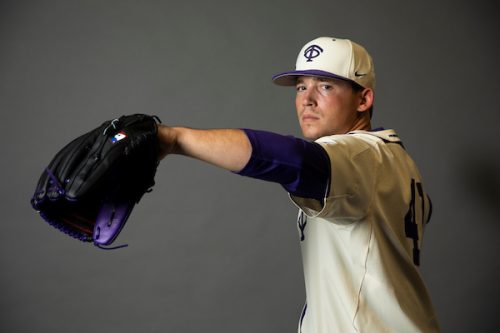
Jared Janczak said being redshirted his freshman season was humbling and gave him the opportunity to earn his way into a starter position. Courtesy of TCU Athletics | Photo by Ellman Photography
I just always had a passion and love for it. Just going to the field every day and hanging out with my teammates and having fun. That’s why I fell in love with the game, just being out there with everybody.
My dad always steered me in the right direction. Early on when we were in Little League, I think I missed one practice because I was out playing with my friend or something, and he said, ‘We don’t have to do it. You don’t have to go practice if we don’t want to do it, but don’t skip out on practice. Once the season ends we can decide what you want to do.’ I said, ‘No, I want to play.’
You mentioned that camaraderie with teammates. Is that your favorite thing about baseball?
Oh, yeah. That’s the thing you remember most — the locker room and the guys, certain guys. You’ll have those few games where you’re like, wow, I remember that game – that was incredible. But at the end of the day, you remember the guy to your left, to your right, and how good teammates that they were and how fun they were to be around. It’s just, that guy was awesome to be around no matter what he did or how well he performed. He was fun, a great teammate. Those are the friendships you keep for a lifetime.
What has been your favorite game so far?
My favorite game? 2017. Regional. Delayed game, got pushed back against Virginia. That was a fun game.
I have a lot of them, but that’s the game I think of — my best performance was that game. On the level I was. I’ve had some other games where I’ve pitched better, but it wasn’t at that high of degree of a regional.
Do your teammates have a nickname for you?
Brian Howard came up with one a couple years ago: J-cation.
2016: This summer we played Omaha and I went to play in Cape Cod summer league. I threw a lot over there, so when we came back for school and to ramp things up, I didn’t throw in practice for a while because they wanted my arm to rest. To them it seemed like I was just lounging around and hanging out, so they said I was on vacation, but they just put J in front of it.
It kind of stuck around a little bit. J-cation or Jannie or Jerry.
Your number is 41. What does that mean to you?
Well, it was given to me. It didn’t have much meaning to it. My number was already taken, so they were like, ‘Here you go. Here’s your number.’
You can make whatever you want out of it, really. You take what you get and you make the best of it. It’s just a number, but I think it’s pretty cool. It’s a special number to me. It doesn’t have a specific reason behind it. I was 11 in high school, so I chose 11. I kept the one.
What would you say has been your greatest accomplishment so far?
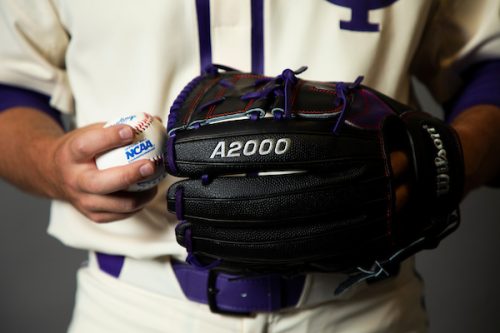
Jared Janczak had surgery in 2018 for thoracic outlet syndrome. Surgeons removed one of his ribs. Courtesy of TCU Athletics | Photo by Ellman Photography
Getting my degree from TCU was pretty awesome. I think with baseball, being redshirted my first year on campus was kind of humbling. As a kid growing up, I was always the first guy picked on the playground, always started, always played. When you get to the collegiate level it’s different.
That kind of year leveled me. I wasn’t really supposed to play, and I thought maybe about transferring. But I really wanted to stay and prove myself that I can start here, and that’s what I told the coaches that summer, went into my redshirt freshman year, that I could prove to be a starter.
They said, ‘All right, just show us this one little bit at a time. Keep pulling the rope.’ I worked my way into the bullpen, and I was the first guy out of the bullpen, most trusted reliever, and in early May, the Baylor series of 2016, I became a starter and I never looked back.
It’s not an accolade – that’s a cool personal accomplishment, I think. You hear a lot of stories about athletes transferring after their redshirt year. When the going gets tough, some guys leave.
I think that kind of goes back to my dad. He really professed to me over the years, ‘Well, you’re going to learn and get better. It’s not going to be easy anymore. It’s just like in life. Buckle down and keep working.’
What’s your claim to fame?
Just being at TCU and doing the best I can here to help the team win. It’s proof you can do whatever you want to do and put the work in and your mind to it.
In my research I found an article from 2004: You had a recipe in a school fundraiser cookbook called What’s Cooking – A+ Recipes with your mom. Is that your claim to fame: Snickers fudge, with a whole can of frosting in it?
I don’t remember that at all, honestly. I’ll have to ask my mom about that. I don’t have a sweet tooth. I love chips, queso and salsa, though.
Are you pretty disciplined about your diet?
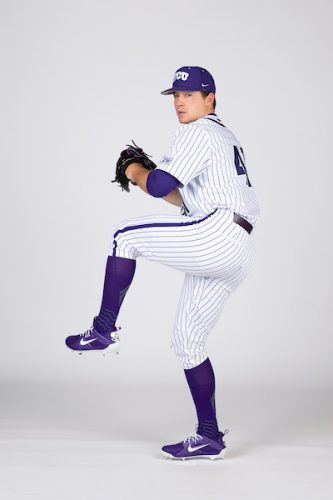
Jared Janczak talked about his pre-game routine. Courtesy of TCU Athletics | Photo by Ellman Photography
I try to be. It’s tough. It’s an 80/20 rule, so 80 percent the week has to be good and 20 percent can be whatever you want.
What’s in your 20 percent?
Chips and queso. Maybe a little quesadilla. I love Mexican food. I just have to watch it. I can eat it every day. Easily. For game days I always eat Chipotle.
Are you superstitious?
Baseball’s not superstitious; it’s called having a routine. That’s my routine.
At the end of the day that’s not going to make or break why I pitched good or pitched bad. It just makes you able to focus — it’s called an hourglass. You have certain things in your routine that let you know, let your body know, that you are kind of working into your start.
You can let your mind relax because you already know what you’re going to do, so you don’t have to think about anything. You’re just kind of getting focused, and narrow your focus to let you go play.
So you start with Chipotle?
I start with the night before for my game-day routine. So the night before, I get the steak, have a baked potato and some broccoli the night before. I go to bed at 10. This year it’ll change. I don’t know what’s going to happen this year, but last year that’s what it was and the year before.
Wake up, go to my class, Chipotle, nap, team meal and then the field. That’s where the hourglass gets smaller.
I started doing that in 2016 because I was always hungry on Sundays when I pitched. I could never eat a big breakfast. I tried to eat a lot, but I can’t. I’ve never been able to eat a big breakfast. I’m like a banana-and-coffee guy, or a banana or something small, couple eggs.
A bunch of guys rub their hands in the dirt. Do you have any of those?
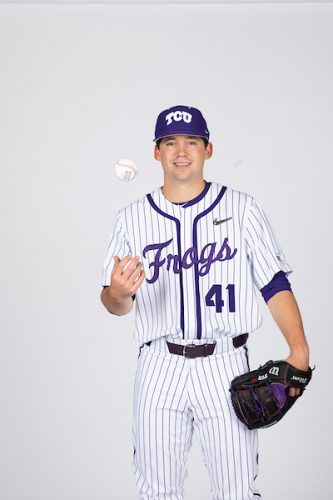
Jared Janczak has been on multiple All-American teams and was a Collegiate Baseball Player of the Week in 2017. Courtesy of TCU Athletics | Photo by Ellman Photography
It’s a little different with pitchers, but for me, when I take the field, I jump over the line, I circle around to the left, get the ball from the third baseman and take off my hat. I look at my shoe (I draw a circle on my shoe as my focal point), take a deep breath, roll my neck, take another deep breath, roll my shoulders and then go on up. It’s not loud; it’s kind of more subtle.
What do you think of that crowd participation?
We feed off of it for sure. It’s awesome. They’ve gotten definitely better over the years since I’ve been here. It was new to them early on. They’re really getting into it. The stadium’s getting better, it’s expanding. You know we’ve got that berm on right field so a lot of people can come and have a great time. From what my family said and friends, it kind of feels like a Minor League game. So it feels pretty cool and has a good atmosphere.
The media and entertainment keep the fans busy between innings and when we’re warming up.
There are some ridiculous things they do — people in hot dog costumes. It’s kind of hilarious. What do you think of all the crowd things?
I don’t watch them. When I’m pitching, I don’t know what’s going on. When I pitch it’s right here. I look a little bit, but not really.
You had surgery over the summer for your thoracic outlet syndrome.
I had my rib removed. My first rib. It was pretty intense.
It was in Dallas. You actually have to do it at a heart and vascular surgeon because it’s so close to your lung – they have to push your lung down to do it.
I had to stay in the hospital for a few days to monitor my lungs and how they were working. I couldn’t move; I couldn’t sit up the first day because I was so sore. It’s not like a repair — nothing’s going to rip again — it’s just really sore. Your body is just kind of freaking out trying to recover, fix itself.
Do you notice that you have a missing bone?
You know, I did for a while. Not anymore. It just kind of goes away and feels normal.
You don’t need it. That rib, technically you don’t need it. It’s like your appendix – you’re evolved or whatever, so you don’t need it but it’s still there.
For overhead throwers, when you throw, it pushes everything up and it hits that nerve and the brachial plexus where your nerves, arteries and veins kind of go out.
Mine wasn’t with arteries and veins; mine was the nerves. There was just a nerve that was irritated. It started in my neck then went down my shoulder to my elbow and my hand.
I think it was Oklahoma State last year where I had no idea where the ball was going. It wasn’t ‘Oh, man, I tore something’ or ‘That really hurt.’ It was just that it didn’t feel right. ‘That’s weird.’ It was kind of achy, a little bit of pinch.
I thought I could rehab and get better, but it didn’t get better. The next Monday I woke up and my neck was just on fire, right where that rib attaches in the back.
Were there any second thoughts?
No, not really. Because it wasn’t a career-ending injury. It was one of those deals that just kind of goes with your genetics and just kind of happenstance, I guess.
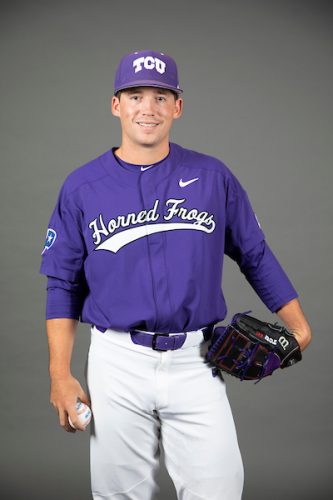
Rehabilitation and physical therapy after surgery to resolve thoracic outlet syndrome didn’t stop Jared Janczak from supporting his teammates. Courtesy of TCU Athletics | Photo by Ellman Photography
The only thing I worried about is if I kept doing it a while I wouldn’t be able to use my arm. You want to be able to raise your kids when you’re older. You want to be able to pick them up. I’m fine now, so no worries. I feel really good.
Last season was cut short for you with your surgery. How did you handle that news?
Yeah, I mean, it was kind of scary. I was a little distraught. Luckily I knew I had one more season here.
I did get drafted that June so I did have a choice, which is nice — I wasn’t forced one way or the other. I had to make a choice of my own and do the pros and cons.
Coming back here for one more year and getting healthy doesn’t sound bad at all — getting back to the promised land.
As you’re recovering, having your teammates and TCU fans rally behind you, what did that mean to you?
I’m incredibly thankful, really. It’s been incredible what they’ve been doing to be able to help me out, fans included.
I kind of lived vicariously through my teammates while I was in rehab pushing them and getting better to where we want to go. So that’s been fun to me. It helped me grow as a leader and as a person.
It’s been fun to kind of see that side of everything. It’s been awesome. We got a good group of guys this year, so it’s been fun to work with them, especially when I’ve been down, but I’ve been in the swing of things for a while now.
What was it like for the Los Angeles Angels to pick you in the draft?
I was surprised. It was a surreal feeling. As a kid growing up just trying to do everything and everybody wants to be drafted no matter where you are. It’s a really cool feeling and kind of hits home. It feels like all your hard work paid off.
But it wasn’t in the cards to go last year, as much as I wanted to. If I was healthy, I would have definitely signed. I have to stay one more year, which I have not regretted one bit. It’s been awesome.
What did campaigns like Lupton Magic or Road to Omaha, or even Knuckle Up or Defend Fort Dixon – what do those mean to you as an athlete?
It’s what you think of when you’re going to play or when fans are yelling things out and have signs out. It’s really cool because it’s our brand; it’s us. Nobody else has it. It’s pretty special.
What are you most looking forward to this season?
Getting back out there and playing and being fully healthy. Going into surgery: ‘I just can’t wait to get healthy.’ That was my thing I thought about the whole time, just getting healthy so I can play without any pain and discomfort and to see what happens after that. Just getting back out there with my teammates to try to win.
What did it feel like to drop that four-year streak of going to the College World Series in addition to your injuries?
It was tough. I sat on the sidelines for the last stretch. If we could have made it to a postseason, especially that group of guys – but, you know, it is what it is. You can’t dwell in the past. You can’t carry bricks with you. It wasn’t very fun while it happened because that’s not what TCU is about, what we strive for here. It happened; you have to learn from it and move on to the next year.
What does redemption look like?
It’s funny you said that. That’s my one-word focus. On all our lockers, each player has a one-word focus. Mine is redemption this year. Redemption is for me, as a team, is getting back to what we do, how we play, what it looks like to be a TCU baseball player and how to act like one. Not saying we didn’t do that last year. It wasn’t as strong as the years past. We had a lot of younger guys who were still trying to learn and trying to keep their head above water. Now this year our older guys know what they’re doing.
As a player it’s just getting back out there and playing fully healthy. Getting back out there and proving that I can still do it.
What is it like to play for a coach who has been with the program 15 years?
He’s definitely left his mark here and he’s got a lot of connections here with donors and family and friends.
He’s not just kind of like a hired gun. In my whole career, I’ve never had a different coach when I came in or left. I’ve always had the same coach in high school and college. You don’t have to start over. A lot of people experience that in college and they haul their system over and everything. Luckily I’ve never had that happen to me.
Do you think that consistency has played into your success?
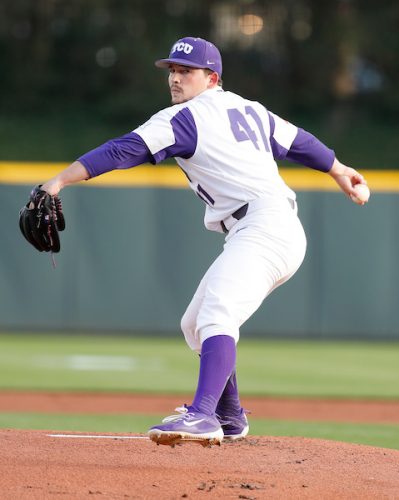
Jared Janczak pitches against Kansas State at Lupton Stadium in 2018. Courtesy of TCU Athletics | Photo by Sharon Ellman
Absolutely, yeah. Especially even the assistant coaches, too. They’ve all been around while I’ve been here. That’s what we appreciate. The best at any level, they’re all going to be good, but how often do you bring it every day? How consistent can you be with your gameplay? Having a consistent environment to be in will in theory provide a consistent gameplay for you.
What was it like to be on multiple All-American teams and to be the Collegiate Baseball National Player of the Week in 2017?
It’s just kind of a byproduct of what I’ve learned and what everybody’s taught me, what my teammates have taught me. They laid a path for me, and then I just took it and ran with it. I don’t shoot for those goals; they are just kind of happenstance from it.
What’s the deal with the mustache?
I just like a mustache. Well, it’s a goatee, kind of. I’m thinking about curling it up this year, we’ll see, like Rollie Fingers. Get a little wax and curl it up. Might as well, right?
I don’t know. Maybe the College World Series depends on your facial hair.
If that happens, I’ll do whatever.
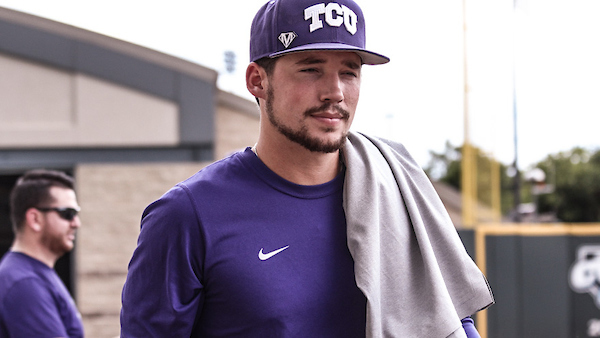
Jared Janczak isn’t superstitious. He said he just grows his facial hair sometimes. Courtesy of TCU Athletics
Editor’s Note: Questions and answers have been edited for clarity and length.
— Trisha Spence

Your comments are welcome
Comments
Related reading:
Sports: Riff Ram
Baseball Players Choose TCU Over MLB
Behind loyal senior leadership, TCU baseball reached its fourth consecutive College World Series.
Sports: Riff Ram
First Person with … Scotty Newton
The triple jumper talks about his Olympic and TCU role models and how he challenges himself to think like a champion.
Features, Sports: Riff Ram
Equestrian Team Is Ready for Another Run
After back-to-back final four finishes, TCU saddles up for a new year.